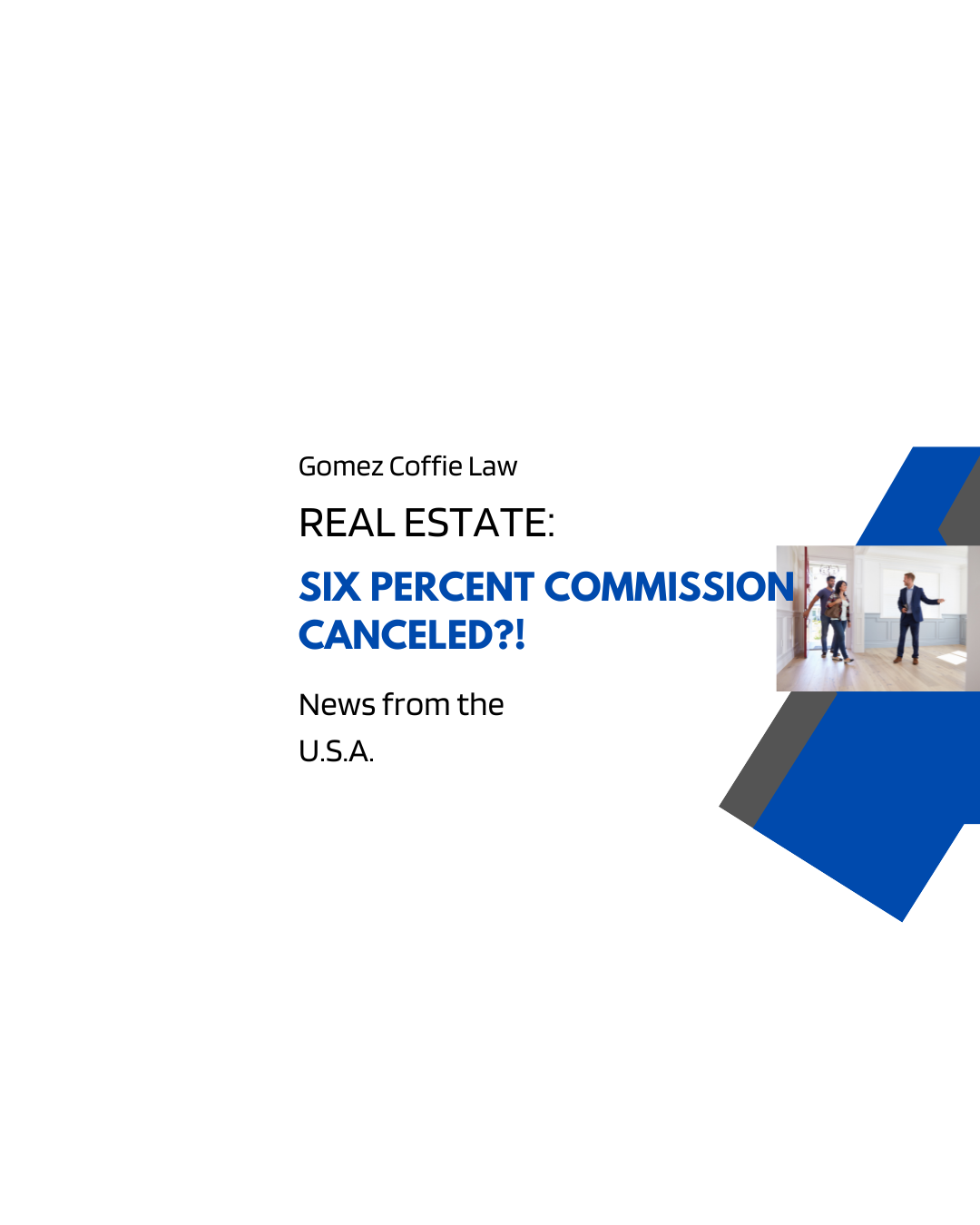Real estate: Six percent commission canceled?!
Purchasing a home is often the most significant financial decision for many. If you get a mortgage, your relationship with your bank will likely last a lifetime or be your longest relationship. Finding your dream home or the home you can afford isn’t always easy. A friendly and professional realtor working with you or for you will likely make the search and finding easier. Of course, we all need to make a living, as do our friendly realtors. That is why they make a commission on the sales. Before the sale, if it even ends up In a sale, the broker would have to spend significant efforts and resources listing your home for sale or finding you a home. If you are a seller, chances are they would have incurred considerable expenses in marketing your property. They organize open houses or viewings, take drone shots, create videos, promote online, etc. Granted, that is the business model they chose to apply.
Some consider realtors commissions a lot; others find it a fair compensation. In Missouri, commissions charged by realtors have been a point of contention, leading to a class action lawsuit in the great state of Missouri. The case name Brunet v. e.a. vs National Realtors Association et al. In that case, it was claimed that these commissions contributed to inflated home prices. In this week’s contribution, I will share some background on that case. That case was based on- competition, aka antitrust law. Yup, the similar laws that Aruba introduced this year. How will this US case impact our local friendly brokers and the consumer? Let’s see.
How did it start?
Your customer is a source of revenue but can also be your worst enemy. A lawyer friend once told me I love my work, but I wish I could do it without having clients. In Missouri, a small group of buyers, about 260,000, decided they were unhappy with the service or the cost they received from their realtors. In particular, they had a beef against the commissions they had to pay the buyer’s broker. Rather than talking about this over coffee or drinks, they started a lawsuit against the National Realtor Association and a bunch of individual brokerage firms, the biggest and most known national firms. Real estate transactions typically involve agents earning a commission, usually 5-6% of the home’s sale price, a tradition rooted in the century-old Multiple Listing Service (MLS) establishment. This system mandates sellers to offer a commission shared between the buyer’s and seller’s agents when listing properties on the MLS. However, home sellers (in Missouri) have voiced concerns that this setup discourages competition, locking buyer brokers’ commissions into a cozy 2-1/2 to 3% range. With most buyers now playing home detective online, the argument is that this arrangement makes little sense—except for the buyer broker, who laughs all the way to the bank. A “ decoupling “ concept would separate these commissions from the sale price, allowing each party to pay their respective agents directly. This approach aims to foster competition among agents and potentially reduce commission rates. By decoupling, buyers and sellers could negotiate the commission, meaning ultimately more competition and lower commissions. The plaintiffs argued that including commission in the sales price artificially inflated the home prices. If commissions were paid independently, buyers would face lower housing prices, and both sides would likely pay lower fees. Of course, I can also argue that the 6% earned by the selling broker was his/her fair and agreed-upon compensation. If the selling broker wants to split the commission with the buyer’s agent, no harm is done.
The sellers in the case argue this defies economic logic, hinting at a potential breach of competition laws and leading to them shelling out more than they bargained for in property purchases. The outcome on October 31st, 2023 – a very scary Halloween for the realtors – was a whopping $1.8 billion award in damages to the plaintiffs. The eight (8) jurors found that the NRA and the brokers had done wrong and acted against the competition laws. The jury found that the NAR artificially inflated home prices by coupling commissions paid to agents. As soon as that verdict hit, the longstanding 6% commission model became questionable, paving the way for a shift, likely a reduction in the buying and selling costs.
The Settlement that followed
On March 15th, 2024, the lawyers for the plaintiffs, www.cohenmilstein.com,
issued a press release announcing a settlement of four antitrust class action cases against the NAR. It involves a $418 million settlement but also introduces new rules to increase transparency and foster competition within the market. The press release shows at least five well-established practices within the real estate industry that must change. These new rules will effectively change how brokers in the USA do business. So, for the male and female realtors in the USA, it will certainly not be business as usual. Things will change, commission structures will shaft, and likely innovative models will be developed and deployed. The goal of all this is to take a transformative step toward making home buying and selling more accessible and affordable for everyone.
Nah, but this is Aruba…..
What do you think this case means for the future of real estate in Aruba? Do you think that under the new Competition Laws of Aruba, it will be business as usual for brokers and their customers? Should we even worry about this? During my upcoming seminar, we will cover this case and its possible implications for realtors and consumers.
Gamechanger
Aruba’s Competition Law went into effect as of January 1st, 2024. Typically,, laws don’t have a retroactive effect. So, this law will be applied to the situations and cases in play today. Even so, I suspect that some enterprises proactively introduced changes to their operations to bring them in compliance with the competition laws. Even if they knew well that before January 1st, 2024, they were violating competition laws principles. A good example is SETAR. Our friends over there for all these years practiced the malicious act of “coupling” (In Dutch: Koppelverkoop”). I covered the “coupling” above. In the case of SETAR, it “coupled” the sale of Cable TV to the sale of Internet and refused (for years) to allow customers to be able to buy either cable or Internet services. Many in the community complained about it, but as good pacifists, no one challenged this “coupling” via the courts. Today, it would have taken a complaint to the competition law authority, www.AFTA.aw, and I am sure the authority would have stopped such lousy faith practices. So next time you see a “coupling” going on, click here and state your case, your complaints, or the facts you want to be investigated.
There is a new sheriff in town, but will it be unbiased?
The Aruba Fair Trade Authority (AFTA) oversees and enforces the competition law in Aruba. It is an independent administrative organ. This means that the minister responsible, in his case, the minister of Economic Affairs, has no say in the affairs of the AFTA. This is at least the situation in theory and as presented in the law and the explanatory notes to the law. We will have to see if this is indeed the case in practice. Do you think the AFTA would have acted against SETAR on the “coupling” issue post-January 1st, 2024, knowing that “their” minister is also responsible for SETAR? I guess we will never know.
Another good question is: will the AFTA aggressively go after the private sector but tread carefully or tip-toe around any public enterprise to avoid making the government look bad?
How will AFTA fulfill its role to promote competition, ensure fair business practices, and prevent anticompetitive behavior across the board? The AFTA’s mandate includes investigating possible violations of competition laws and assessing mergers, acquisitions, and their impact on the competition. This authority is essential in maintaining the market’s integrity and consumers’ welfare in Aruba. Aruba’s Competition Law covers all economic activities. Businesses of all sizes, both in the public and private sectors, are included. These regulations promote fair competition in various industries and prevent practices that harm market integrity or consumers’ interests.
Going forward
The landmark settlement in the United States against the National Realtors Association and its consequential upheaval in the long-standing 6% commission model represents a monumental shift in real estate transactions and brokerage operations. This pivotal development underscores the importance of competition laws and their profound impact on maintaining market integrity and fostering fair business practices. As the global real estate market closely watches the aftermath of this settlement, its implications extend far beyond the borders of the United States, echoing in jurisdictions with similar competitive concerns, such as Aruba.
The recent introduction of competition laws in Aruba, aimed at promoting fair trade and preventing anticompetitive behavior, signifies a parallel stride towards transparency and equity in the marketplace. The U.S. case and settlement serve as a critical reminder of the need for local markets to adapt and align with these evolving legal standards to ensure an equitable, competitive, and thriving economic environment. For Aruba, this is not merely a matter of legal compliance but a crucial step towards safeguarding consumer interests and realtors’ interests, stimulating innovation, and enhancing the overall competitiveness of its real estate sector. As we move forward, the significance of these developments cannot be emphasized enough, marking a new era in real estate transactions that prioritizes fairness, transparency, and consumer welfare above all.
In light of these developments, it is imperative for realtors, particularly those operating within Aruba and similar jurisdictions, to recognize the significant changes heralded by the U.S. case and settlement. This transformative period in the real estate industry calls for a proactive stance from realtors. They must stay abreast of the evolving legal landscape and consumers’ shifting expectations.
Realtors should continue to educate on competition laws and ethical business practices, positioning themselves as trusted advisors in an increasingly competitive market. Embracing transparency, exploring innovative business models, and fostering fair competition can ensure compliance with new regulations and enhance their service value to clients. By doing so, realtors will navigate these changes successfully and lead the charge toward a more equitable and consumer-friendly real estate market. The future of real estate demands adaptability, ethical practices, and a commitment to fair dealing, elements that will define the success of realtors in the new regulatory environment.















